Kindness and Community Are My Ideal World
Broken Bone Bathtub and A Modern Theatre of Empathy
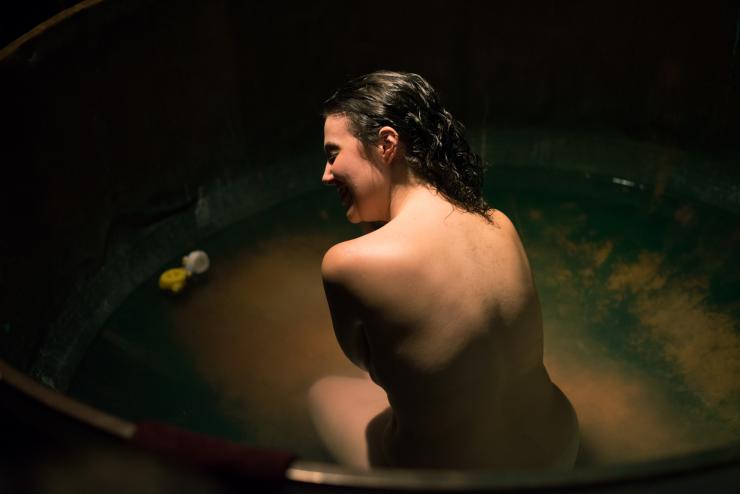
We did our best, but things fell apart.
The results of 2016’s presidential race were, for many, traumatic, and as with any trauma instilled a pervasive sense of helplessness and bewilderment. Despite our participation in a democratic system, and faith that our values would prevail, November 8, 2016, saw not only a failure of these efforts but an outright reversal of fortune. Worse, the overt racism, xenophobia, and misogyny that followed left us questioning the nature of our social reality; how, in a seemingly progressive age, could these attitudes persist? Though the initial shock has subsided, it’s clear significant change has occurred, and in its aftermath we must now confront our role in the events which transpired, face the limits of our reach, and take responsibility for what we build moving forward. The 2017 New York City revival of Siobhan O’Loughlin’s immersive solo show Broken Bone Bathtub holds special relevance in this context, its unique premise and interactive framework as empowering as it is cathartic.
Premiering in Tokyo in April 2015, Broken Bone Bathtub is inspired by creator-performer Siobhan O’Loughlin’s true story of injury, healing, and interdependence. The previous October, while biking to an activist meeting near Brooklyn’s Prospect Park, O’Loughlin broke her hand in a head-on collision with another cyclist. Living alone at the time, and unable to shower with her cast, O’Loughlin began taking baths at friends’ apartments, the act of which helped soothe the loneliness and insecurity of her recovery. The show exists as a stylized nod to this original “bathtub tour,” and thrives through the same philanthropic model which bred it: individuals seeking to host the piece contact O’Loughlin through the show’s website, and O’Loughlin invites audiences into their donated spaces to share in her story and help her bathe. Since its inception, the show has played in over 200 different locations in fifteen cities, from Brooklyn to Baltimore to Belfast.
As the (shower) curtain rises and guests seat themselves around the tub, a naked O’Loughlin … lifts her casted hand and begins.
Audience members receive the host’s address upon ticket purchase; the February 17 performance I attended occurred in a spacious loft in New York City’s Flatiron District. This venue allowed for larger-than-average capacity; while groups of 4–8 are standard, this evening hosted roughly twenty attendees. Moreover, the setting gave rise to some distinctive trappings: a wandering mandolinist entertained guests over pre-show refreshments, and O’Loughlin’s performance took place in a repurposed metal cheesemaker’s vat. Though the show relies on audience interaction, participants may choose their level of involvement: viewers comfortable with bathing O’Loughlin are placed closer to the tub, while those desiring less-direct contact may opt to hang back.
As the (shower) curtain rises and guests seat themselves around the tub, a naked O’Loughlin, fetal-crouched to protect her modesty, lifts her casted hand and begins. Poking fun at the circumstances, and encouraging audience members to share their stories of communal bathing, her warm banter instantly dissolves the tension. She launches into her tale of injury, quick to establish that while she’s been in several accidents, she’s generally a responsible cyclist, always “trying, really trying [her] best” to act conscientiously on and off the bike. But she still cannot pinpoint the facts of that fateful night, the darkness, rain, and convoluted bike lane obscuring just what, or who, was at fault. Eager to resume her journey, it was not until glimpsing her mangled hand that O’Loughlin grasped the full extent of the damage and employed a bystander to get her upright and into an ambulance. Notorious for our self-sufficiency, New York audience members nod, laugh, and wince in recognition. Individuals, urged to discuss prior accidents, hold forth: a triathlete describes his training mishaps; one woman’s innocuous childhood fall was revealed, days later, to have resulted in a broken arm. Buzzed into the apartment and good-naturedly mocked, a latecomer displays a scar from a recent face-plant on the Williamsburg Bridge.
The weeks after the event, and the months of healing that followed, brought O’Loughlin face-to-face with the myriad physical, social, and emotional connections on which we rely. Treatment at a hospital accepting of her Obamacare insurance came through the help of a fellow activist, who shrugged off O’Loughlin’s thanks with the admission that “kindness and community are my ideal world.” Confessing her jealousy of the other cyclist’s supportive boyfriend, O’Loughlin fondly recounts the level-headedness with which her brother handled her painkiller-dazed long-distance calls. Accustomed to self-reliance and social responsibility, she encapsulates the difficulty, and importance, of requesting aid with a charmingly awkward anecdote of juggling her cast and two compost bags while helping a stranger bury a pigeon. Whether referring to her recovery process or to past and current political turmoil, O’Loughlin maintains that such expressions of humanity buoy her in moments of despair, the simple comfort of holding hands as monumental as the sight of Black Lives Matter protestors or citizens donating time, money, and blood in the wake of public tragedies.
Even when addressing loaded topics from chronic pain to public crying, O’Loughlin guides the show’s verbal interactivity with ease… audiences rise to it: we are, by nature, hardwired to share our stories, and eager to see them reflected in others’.
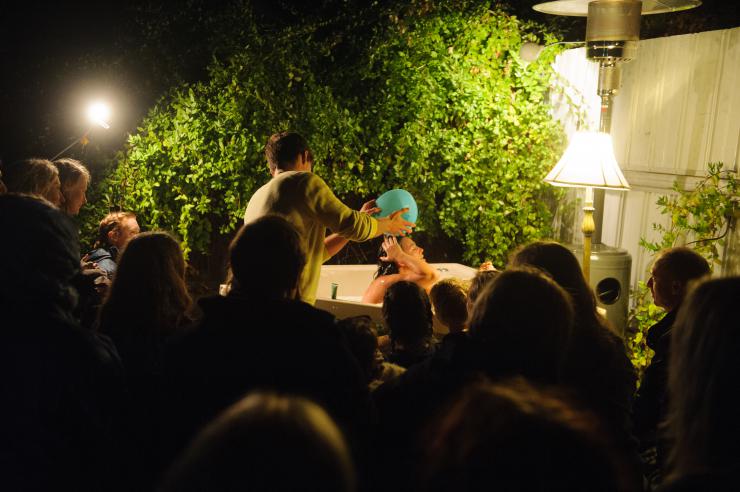
More strikingly, but no less organically, O’Loughlin pauses during several points in her tale and asks audience members to help wash her hair, scrub her back, or massage her non-injured hand. Given the evening’s pre-established intimacy, and O’Loughlin’s mix of gratitude and nonchalance, this process is disarmingly natural on both ends: Something happened. Simple things got complex. We help each other. Even when addressing loaded topics from chronic pain to public crying, O’Loughlin guides the show’s verbal interactivity with similar ease, her questions more conversational than interrogative. Uncannily, but unsurprisingly, audiences rise to it: we are, by nature, hardwired to share our stories, and eager to see them reflected in others’. Rooted in a first-person narrative, by its conclusion Broken Bone Bathtub becomes as much our story as O’Loughlin’s, its insights applicable to every experience of physical or emotional struggle and echoed in every triumph of humor, generosity, and connection.
If theatre’s effectiveness lies in its simultaneous embodiment of, and capacity to transcend, the human condition, Broken Bone Bathtub thrives as both a work of theatre and a manifesto for the modern age. We need not look far to witness the communal instinct it evokes: directly after the election, our impulse was to congregate and share—organizing in streets and town halls, processing experiences on stage and in living rooms, lending ears, hands, and shoulders to our most vulnerable. As administrative policies reflect a disregard-bordering-on-dehumanization of those they affect, the piece’s focus on individual accounts as intrinsically valid and universally relatable morphs from stylistic quirk to fervent appeal. Most importantly, by revealing the significance of seemingly small actions, and highlighting the reciprocity of the helper-helped exchange, Broken Bone Bathtub reminds us of a strength too easily forgotten and reframes our weaknesses as pathways to that strength. We gather not just to nurse our wounds but to remember our power.
In a world rife with public and private trauma, Broken Bone Bathtub stands out in its unconventional expression of life’s most basic truths: We do our best. Things fall apart. Simple things get complex. We help each other.

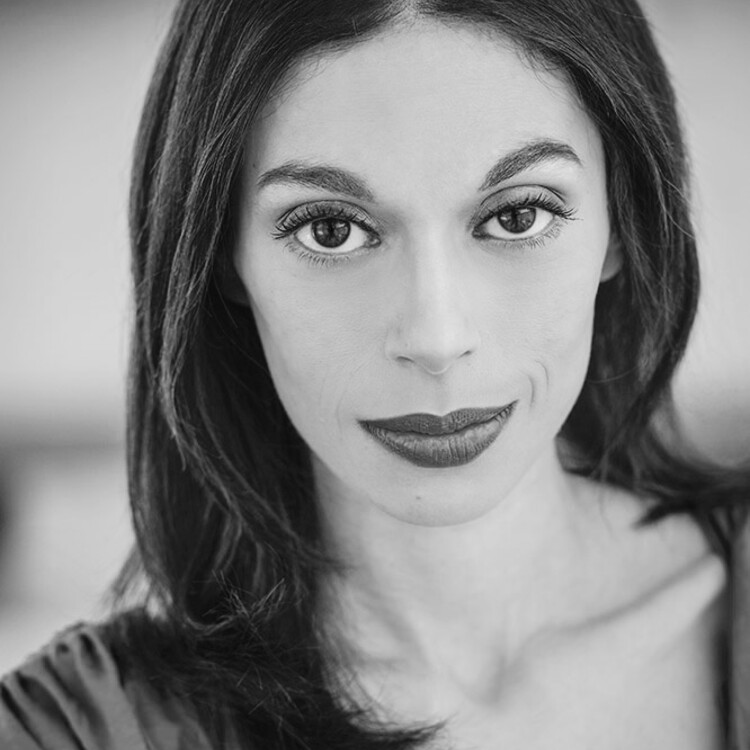
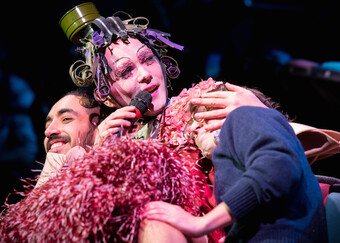

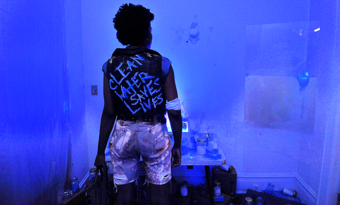

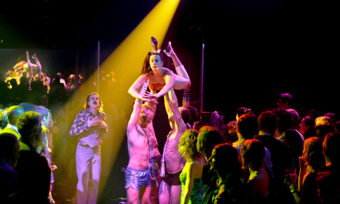

Comments
The article is just the start of the conversation—we want to know what you think about this subject, too! HowlRound is a space for knowledge-sharing, and we welcome spirited, thoughtful, and on-topic dialogue. Find our full comments policy here
Thank you so much for writing about this piece, it truly struck home for me. From empathy in its simplicity to the phrase, "Kindness and Community are my ideal world", I couldn’t agree more that everything you described, and the feeling you provoked felt 100% relatable. I was not born in New York, but I was raised to be incredibly independent, and asking for help is something I personally struggle with, and so I appreciate the way your interpretation of "Broken Bone Bathtub" helped me think of my weakness as a place I can grow and better myself. I also enjoyed the way you tied the interconnectedness of this piece to the election, and the collaboration that followed in retaliation against oppressive ideals and opinions. I was wondering if you had any idea as to whether “Broken Bone Bathtub” is still touring. And if so where she will be next?
Hi Keena! Glad you connected to the article and the piece's themes. You can keep track of "Broken Bone Bathtub's" future productions on the show's website: http://www.brokenbonebathtu....
This is beautiful. Thank you.
Thank you, Lee!